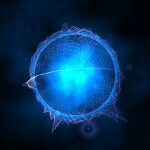Link to Pubmed [PMID] – 9889120
Curr. Biol. 1999 Jan;9(1):30-41
BACKGROUND: The transport of macromolecules between the nucleus and cytoplasm is an energy-dependent process. Substrates are translocated across the nuclear envelope through nuclear pore complexes (NPCs). Translocation requires nucleocytoplasmic transport receptors of the importin beta family, which interact both with the NPC and, either directly or via an adaptor, with the transport substrate. Although certain receptors have recently been shown to cross the NPC in an energy-independent manner, translocation of substrate-receptor complexes through the NPC has generally been regarded as an energy-requiring step.
RESULTS: We describe an in vitro system that is based on permeabilised cells and supports nuclear export mediated by leucine-rich nuclear export signals. In this system, export is dependent on exogenous CRM1/Exportin1 – a nuclear export receptor – the GTPase Ran and nucleotide triphosphates (NTPs), and is further stimulated by Ran-binding protein 1 (RanBP1) and nuclear transport factor 2 (NTF2). Unexpectedly, non-hydrolysable NTP analogues completely satisfy the NTP requirements for a single-round of CRM1-mediated translocation of protein substrates across the NPC. Similarly, single transportin-mediated nuclear protein import events are shown not to require hydrolysable NTPs and to occur in the absence of the Ran GTPase.
CONCLUSIONS: Our data show that, contrary to expectation and prior conclusions, the translocation of substrate-receptor complexes across the NPC in either direction occurs in the absence of NTP hydrolysis and is thus energy independent. The energy needed to drive substrate transport against a concentration gradient is supplied at the step of receptor recycling in the cytoplasm.

